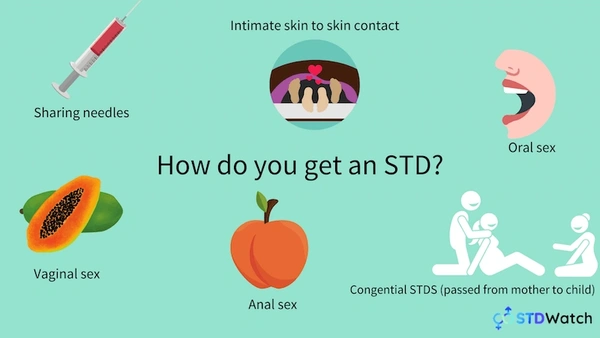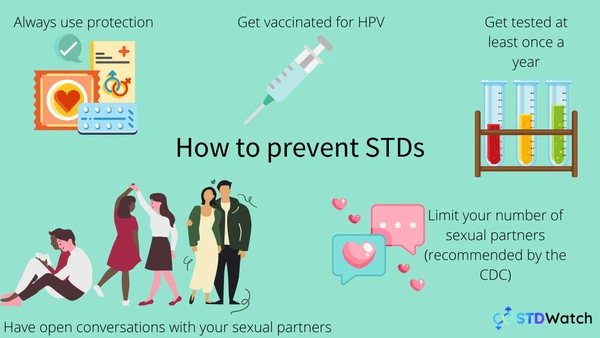How do you get an STD? Here’s an easy to understand breakdown on all of the different ways you can contract an STD as well as the steps that you can take to protect yourself best.
First things first, if you are reading this article and are feeling stressed that you may have contracted an STD. Know that sexually transmitted diseases are extremely common, in fact in 2018, 20% people had an STD on any given day, according to the Centers for Disease Control and Prevention.
If diagnosed and treated early, sexually transmitted diseases are relatively easy to treat, and should not lead to other health complications.
How do you get an STD?
You can get an STD via:
- Vaginal sex
- Oral sex
- Anal sex
- Intimate skin-to-skin contact
- Close intimate contact
- The sharing of infected needles or exposure to infected blood
Sexually transmitted diseases can be passed through:
- Vaginal fluid
- Semen
- Saliva
- Blood
- Open sores or lesions
In simpler terms, the most common way that you can get an STD is through unprotected penetrative sex and/or close intimate contact)
It is also possible to pass an STD to a baby during childbirth.
There are three different types of sexually transmitted diseases:
- Bacterial (STDs that are caused by bacteria)
- Viral (STDs that are caused by viruses)
- Parasitic (STDs that are caused by parasites)
Each type of sexually transmitted disease is contracted differently.
How can you get a bacterial STD?
You can get a bacterial STD through coming into direct contact with infected bodily fluids including semen, vaginal fluids, saliva and blood.
How can you get a viral STD?
You can get a viral STD such as herpes through intimate skin-to-skin contact, whether that be oral, vaginal or anal sex. Herpes can be transmitted through mouth-to-genital contact and vice versa.
HIV and Hepatitis B can be contracted through contact with infected blood (the sharing of needles) or open sores (intimate skin-to-skin contact).
Viral STDs can also be passed through direct contact with infected bodily fluids including semen, vaginal fluids, saliva and blood.
How can you get a parasitic STD?
You can get a parasitic STD through close intimate skin-to-skin contact. Public lice can be transferred through the sharing of sheets or clothing that have come into contact with infected pubic lice.
Let’s break the most common STDs into each category:
- Bacteria (Chlamydia, Gonorrhea, Syphilis, Mycoplasma, Bacterial vaginosis)
- Viral (HIV, Herpes (1& 2), Human papillomavirus (HPV), Hepatitis B)
- Parasitic (Trichomoniasis, Ureaplasma, Pubic lice)
How to avoid getting an STD
You can avoid getting an STD by:
- Always using a condom or dental dam when having penetrative sex
- Limiting your number of sexual partners
- Having open conversations with your sexual partners about their sexual history
- Having open conversations with your sexual partners about their current sexual activities
- Getting vaccinated, both males and females should get vaccinated for HPV if possible
- Undergoing a sexual health screening at least once a year
Avoid Long-Term Effects of STIs. Get Checked Now. STD Testing is Quick, Easy & Discreet!
FAQs
Can I get an STD from a toilet seat?
It is highly unlikely, and almost impossible to get an STD from a toilet seat.
What are the most common STDs in the United States?
The most common STDs in the United States, according to the Centers for Disease Control and Prevention, include:
- HPV
- Chlamydia
- Gonorrhea
- Syphilis
How long does it take for an STD to go away?
The length of time it takes for an STD to go away will depend on the type of STD that you have, and how early it is detected. STDs that are being treated with antibiotics usually take two weeks for symptoms to go away.
What is usually the first sign of an STD?
The first sign of an STD will depend on the type of STD that you have contracted.
Read STD symptoms in men and STD symptoms in women to learn more about the signs and symptoms of sexually transmitted diseases.
Resources
- Sexually Transmitted Diseases - cdc.gov
- The lowdown on how to prevent sexually transmitted disease- cdc.gov
- Reported STDs in the United States, 2018 - cdc.gov
- STD symptoms in men | Everything you need to know - stdwatch.com
- STD symptoms in women | Everything you need to know - stdwatch.com


